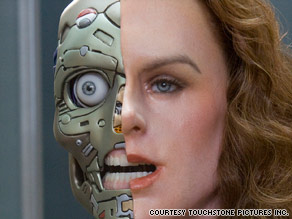Ever since I first read I, Robot by Isaac Asimov I have been interested in robotics and AI. Back in 1996 or so I had no idea that simulation of a brain might be possible in my lifetime. John Lehrer with Seed Magazine has written a very interesting article, “Out of the Blue“, which covers the Blue Brain project led by Henry Markram. One of the biggest challenges was determining how exactly a neuron is supposed to behave. Without that information, it would be impossible to simulate it. One of the freaky things about this project is that they have a robot conducting experiments and recording data 24/7. This robot is more efficient than 10 experienced lab technicians combined. I would assume that this robot only has enough programming to complete these experiments, but what if robots become sentient? What would keep them from creating other more capable robots? The current project aims to first simulate the brain of a 2 week old rat, which would then be transferred to a robot body to see how it develops.
With the current progression of technology, Markram suggests, “In ten years, this computer will be talking to us.” That seem a bit crazy, but who would have thought 10 years ago that there would technology capable of simulating 10,000 neurons and 30 million synaptic connections? That currently only represents a small slice of a 2 week old rat brain, but given how fast computing power is growing, I can’t see why Markram’s prediction would be impossible. If not 10 years from now, why not 20, or 30? I think that it is just a matter of time. I highly recommend reading the full article, especially if you have any interest in robotics or AI.

